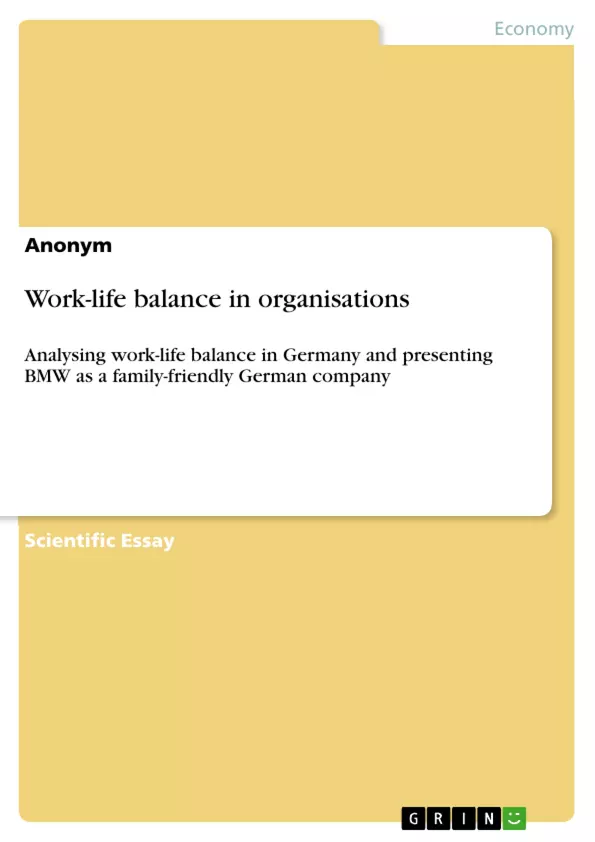1. Introduction
The following paper describes the work-life balance movement in Germany and the work-life balance policies of the German car and motorcycle producer BMW. First, work-life balance (WLB) will be defined and the importance of leisure for WLB will be briefly explained. Next, the paper will provide information about leisure in Germany and explain some reasons for the German WLB movement. By describing the WLB policies of BMW, the paper will examine the influence organisations can have on their employees’ WLB and the reasons organisations have to introduce WLB programmes. The paper will argue that WLB policies provided by organisations need to be managed professionally to result in a win-win situation.
Inhaltsverzeichnis (Table of Contents)
- Introduction
- The importance of leisure for work-life balance
- Work-life balance in Germany
- Leisure time and leisure activities in Germany
- Work-life balance movement in Germany
- BMW as an example for a family-friendly company
- Work-life balance at BMW
- Win-win situation
- Work-life balance policies in organisations: implications for managers
Zielsetzung und Themenschwerpunkte (Objectives and Key Themes)
This paper investigates the work-life balance movement in Germany and examines the work-life balance policies of BMW, a German car and motorcycle producer. It aims to define work-life balance, highlight the importance of leisure, and delve into the specific context of work-life balance in Germany. The paper also explores the impact of organizational policies on employees' work-life balance, particularly at BMW, and examines the reasons for the introduction of such programmes. Ultimately, it argues that organizations need to implement work-life balance policies professionally to create a win-win situation for both employees and the company.
- The importance of leisure for work-life balance
- The work-life balance movement in Germany
- The influence of organisations on employees' work-life balance
- The reasons for organisations to introduce work-life balance programmes
- The need for professional management of work-life balance policies
Zusammenfassung der Kapitel (Chapter Summaries)
- Introduction: This chapter defines work-life balance and emphasizes the significance of leisure in achieving a healthy balance between work and personal life. It sets the stage for the exploration of the work-life balance movement in Germany and the case study of BMW.
- The importance of leisure for work-life balance: This chapter emphasizes the crucial role of leisure in fostering a satisfying work-life balance. It defines leisure as time not occupied by paid work, unpaid work, or personal chores, highlighting its importance for well-being and enjoyment. The chapter also connects leisure to improved mental and physical health by demonstrating how adequate free time reduces stress and prevents burnout.
- Work-life balance in Germany: This chapter delves into the specific context of work-life balance in Germany. It examines the high levels of leisure time enjoyed by German citizens, attributing it to factors such as shorter working hours and generous paid leave. The chapter also presents data on leisure activities in Germany, revealing a strong emphasis on leisure and a robust foundation for a balanced lifestyle. It then transitions to the work-life balance movement in Germany, outlining the factors that contributed to its emergence, such as increasing female participation in the workforce and rising work pressure.
- BMW as an example for a family-friendly company: This chapter highlights BMW as a case study of a family-friendly company in Germany. It focuses on the specific work-life balance policies implemented by BMW, examining their impact on employees and the reasons behind their introduction.
Schlüsselwörter (Keywords)
Work-life balance, leisure, Germany, BMW, family-friendly, organizational policies, win-win situation, employees, stress, burnout, leisure activities, work-life balance movement, gender equality, working hours, paid leave, employee experience, organizational initiatives.
Frequently Asked Questions
How is Work-Life Balance (WLB) defined?
WLB refers to the equilibrium between professional responsibilities and personal life, where leisure time plays a crucial role in reducing stress and preventing burnout.
What are BMW's policies regarding Work-Life Balance?
The paper highlights BMW as a family-friendly company that implements specific WLB programmes to support its employees' mental and physical health and manage work pressure.
Why do German citizens enjoy high levels of leisure time?
Factors contributing to this include shorter average working hours, generous paid leave, and a strong cultural emphasis on leisure and well-being.
What is the "win-win situation" in WLB policies?
When managed professionally, WLB policies benefit employees through improved well-being and benefit the organization through increased productivity and employee retention.
What triggered the Work-Life Balance movement in Germany?
Key factors include the increasing participation of women in the workforce, rising work-related stress, and a growing demand for gender equality in both professional and domestic spheres.
- Citar trabajo
- Anonym (Autor), 2010, Work-life balance in organisations, Múnich, GRIN Verlag, https://www.grin.com/document/152197



